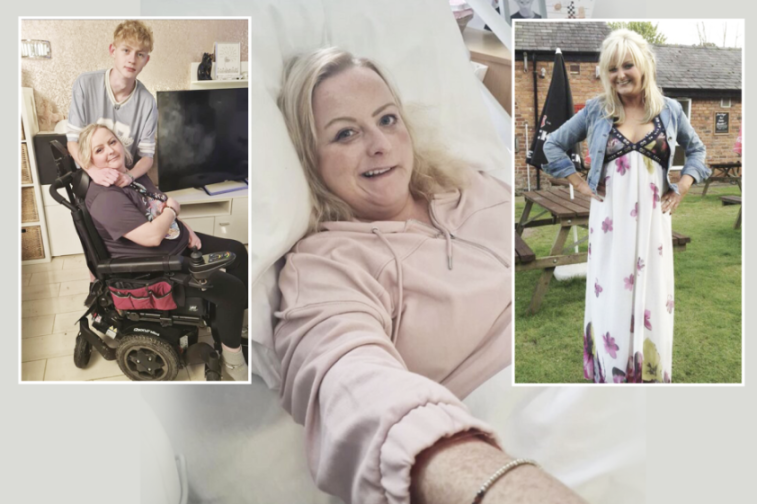NIKITA Sterling was told her brain tumour “could have been growing for 20 years” after suffering random migraines since she was 18.
The 39-year-old had also experienced visual disturbances and “intense pressure” headaches , but she never sought help because they only happened two or three times a year.
 Nikita Sterling has suffered from migraines for decades
Nikita Sterling has suffered from migraines for decades
 An MRI revealed her symptoms were being caused by a ‘large’ tumour in her brain
An MRI revealed her symptoms were being caused by a ‘large’ tumour in her brain
That was until October 2024, when the secondary school psychology teacher from Medway, Kent, noticed “significant changes”.
The “migranes” would occur “every three weeks” and she experienced increased pressure where it felt like someone was “filling (her) head up with water”.
She once “lost the ability to talk” at a parents’ evening.
“I just couldn’t think of the words I needed to say, it was really embarrassing,” Nikita said.
Nikita said her symptoms worsened over subsequent months, but she struggled to get a doctor’s appointment or to “get a doctor to listen”.
In February 2025, she sought help from a private GP through her husband’s work insurance, and was referred to see a neurologist, with the earliest appointment in May.
“I thought I can manage until then, at least I know I will see someone,” she said.
Nikita’s symptoms took a turn, however, and she said she would “black out” and “wake up in a puddle of sick” – worrying her husband of nine years, Dean, 40, and her two children, Sebastian, eight, and Florence, five.
She was forced to stop working because of her health.
Nikita said her sister pushed her to pay privately for an MRI scan , which cost £400.
“We were due to go on a big family holiday and she asked me to get one to check I would be safe to fly,” Nikita explained.
“Luckily, I could afford to pay but I just think there must be so many people that can’t afford to do that.”
Nikita had the MRI scan in April this year at a clinic in Maidstone, Kent, saying they phoned her just hours later to say she urgently needed to go to A&E.
‘I was shocked’
The results of her scan were sent to Medway Hospital, where a doctor informed her there was a “large mass” on her frontal lobe, which was later diagnosed as a meningioma – a non-cancerous brain tumour .
“I broke down, it had taken so long to reach this point,” Nikita said.
“I was shocked at how big (the tumour) was, and all the extra white stuff around it on the scan was swelling, which was causing all my head pressure.”
 The mum had a four-hour operation to remove the mass
The mum had a four-hour operation to remove the mass
 The tumour was a meningioma – meaning it was non-cancerous
The tumour was a meningioma – meaning it was non-cancerous
Nikita said she was referred to King’s College Hospital in London, and they took on her case.
A neurosurgeon told her the best course of action was surgery to remove the tumour.
“They didn’t know what it was at that point, but the longer we left it, the more damage it could cause,” she said.
Nikita had a four-hour operation to remove the mass on April 22 this year – her husband’s 40th birthday.
“It was all much harder on my family than it was for me, I remember feeling really calm and safe, but I think I’d be an absolute mess if I had to watch my husband getting wheeled away,” she said.
Nikita said her young children “coped with it really well”, and they gave her their teddy bears to take with her into hospital.
Doctors suspected the tumour “could have been growing for 20 years”.
“I felt complete relief when I was told it was benign,” she said.
“This is the best outcome I could have received and I feel really, really lucky.”
Lingering issues
Nikita said doctors were able to remove the tumour in its entirety, and she will have a six-month post-surgery scan in the coming weeks.
She said she has recovered well from the operation, but she now becomes fatigued more easily – which has been the “hardest thing to deal with”.
As for her migraines, Nikita said these have dissipated and her symptoms have eased.
 The teacher has since recovered but now becomes fatigued more easily
The teacher has since recovered but now becomes fatigued more easily
 Nikita said her young childen, Sebastian, eight, and Florence, five, coped very well
Nikita said her young childen, Sebastian, eight, and Florence, five, coped very well
If she starts to experience a visual disturbance , usually the first indication she is going to have a migraine, she can take medication which will “stop them in their tracks”.
She will also gradually phase back into teaching from September.
Nikita’s husband, Dean, is taking on the Climb the Capital challenge in October to raise money for The Brain Tumour Charity.
The feat involves tackling three of London’s skyscrapers – the Cheesegrater, the Scalpel and the Walkie-Talkie – in a challenging stair-climb.
 rpt
rpt The most common symptoms of a brain tumour
More than 12,000 Brits are diagnosed with a primary brain tumour every year — of which around half are cancerous — with 5,300 losing their lives.
The disease is the most deadly cancer in children and adults aged under 40, according to the Brain Tumour Charity .
Brain tumours reduce life expectancies by an average of 27 years, with just 12 per cent of adults surviving five years after diagnosis.
There are two main types, with non-cancerous benign tumours growing more slowly and being less likely to return after treatment .
Cancerous malignant brain tumours can either start in the brain or spread there from elsewhere in the body and are more likely to return.
Brain tumours can cause headaches , seizures , nausea , vomiting and memory problems , according to the NHS .
They can also lead to changes in personality weakness or paralysis on one side of the problem and problems with speech or vision.
The nine most common symptoms are:
- Headaches
- Seizures
- Feeling sick
- Being sick
- Memory problems
- Change in personality
- Weakness or paralysis on one side of the body
- Vision problems
- Speech problems
If you are suffering any of these symptoms, particularly a headache that feels different from the ones you normally get, you should visit your GP.
Source: NHS







